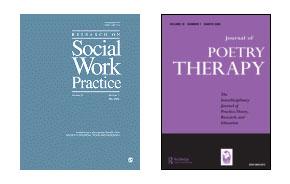One College: Two Journals

One of the College of Social Work’s unique qualities is that it is home to two well-respected scholarly journals. Both journals were founded and are currently edited by faculty members from the FSU College of Social Work. The Journal of Poetry Therapy is edited by Dean Nick Mazza and Research on Social Work Practice is edited by Professor Bruce Thyer. Both faculty members’ talents have contributed to creating these resources, which continue to enrich research and practice in social work and related disciplines.
A Brief Interview with Bruce Thyer, Editor of Research on Social Work Practice

How did Research on Social Work Practice originate?
I established RSWP in 1990, with our first issue in 1991. I approached Sage Publications with a proposal for a new social work research journal that would focus on intervention research in social work, as well as articles reporting on the development of new assessment methods useful in social work research or practice. At the time, many of the existing social work journals offered mediocre peer review, and often treated submitting authors disrespectfully, not acknowledging submissions, provided unduly critical commentary, and an extremely long publication lag between the final acceptance of an article and publication. I wanted to make RSWP an attractive alternative outlet to these existing journals.
How long have you been editing the journal?
I have been editing the journal since 1990.
What does the journal contribute to the research and practice of social work?
RSWP is the most highly cited true social work journal in the world, according to the 2011 impact factor scores produced by the Institute for Scientific Information. More people now cite research appearing in RSWP than they cite studies appearing in the NASW journal “Social Work”, in the “British Journal of Social Work” or the “Social Service Review”, the field’s traditional leading journals. The journal is provided as a membership benefit to persons belonging to the Society for Social Work and Research. We have around 7000 subscribers, and in 2011 over 150,000 PDF articles were downloaded from the journal’s website. We publish more randomized controlled trials, quasi-experimental outcome studies, meta-analyses, and systematic reviews than any other social work journal. It is the primary outlet for intervention research studies in the field of social work.
What does the future look like for RSWP?
Future goals include getting the journal listed in PubMed, one of the most highly respected citation and indexing services. To date, no social work journal is listed in PubMed. I also would like to develop a system wherein readers can earn continuing education in social work and related fields by reading articles that have appeared in the journal. I am also exploring the option of making the journal available at a low cost to social workers who are members of the American Evaluation Association. I encourage social workers interested in the journal to obtain a subscription to it by joining the Society for Social Work and Research (www.sswr.org), and get their subscription as a SSWR membership benefit. This is a much better deal than paying for an individual subscription.
Link to Research on Social Work Practice
A Brief Interview with Dean Nick Mazza, Editor of the Journal of Poetry Therapy

How did the Journal of Poetry Therapy originate?
In 1983, I was given the opportunity to serve as the Editor of the National Association for Poetry Therapy (NAPT) Newsletter. In the absence of a journal for the organization, I tried to incorporate journal type content in the newsletter. This included brief articles, book reviews, practice and research abstracts, and original poetry. In 1986, I was approached by Norma Fox, Managing Editor at Human Sciences Press. She had seen the newsletter and asked if I was interested in proposing a quarterly journal. I submitted a formal proposal and was fortunate to have it accepted by the publishing board. JPT is now published by Taylor and Francis.
How long have you been editing JPT?
I have been the Editor of JPT for twenty-six years (first issue was Fall 1987).
What does JPT contribute to research and practice?
In the ‘‘Editor’s Note’’ of Volume 1 Number 1 (1987), I wrote: ‘‘The Journal pages will be open to a wide range of theories, techniques, philosophies, and research methods . . . The Journal is arriving amidst high tech times with a concomitant search for scientific validation of therapeutic approaches. The Journal of Poetry Therapy has the potential to make a contribution to the restoration of the balance between art and science…” In that first issue of JPT, I reflected on the importance of the ‘‘heart’’ of scholarship by mentioning how my children (Nicole, age 5 and Chris, age 2 at the time) joined me in my work at home on the journal by bringing in their toys, coloring book, and crayons. It appeared to me that colors and honesty of language were central in 1987 and I still believe that they remain central today in a time of ‘‘evidence-based’’ practice. The ‘‘evidence’’ should come from multiple sources (e.g., traditional research designs, case studies, practitioner reports, creative works, etc.). Now, a quarter century later, I can state that the Journal of Poetry Therapy continues to be open to a wide range of scholarship. Poetry therapy has been addressed in the literature as a discipline, a therapeutic entity (e.g., practice model), set of adjunctive techniques, theory, and philosophy. JPT welcomes a variety of scholarly articles including theoretical, historical, literary, practice, and evaluation studies. Original poetry, dissertation abstracts, and book reviews relevant to poetry therapy have also been published.
The convergence of literary and therapeutic viewpoints is a strength that is unique to the Journal of Poetry Therapy in providing a depth of inquiry that fosters critical thinking, creativity, discipline, and discovery. This strength has not always been recognized by research databases limited by research preference, discipline or professional association. Perseverance, however, does pay off: Currently, according to Worldcat, there are 465 institutions subscribing to JPT. Regarding the presence of JPT in research databases, it continues to be well represented including the following: Google Scholar, PsycINFO, IBR International Bibliography of Book Reviews of scholarly Literature on the Humanities and Social Sciences, IBZ International Bibliography of Periodical Literature on the Humanities and Social Sciences, Articles First (part of Worldcat), and MLA (Modern Language Association) continue to index all articles from JPT. JPT is listed in the current edition of An Author’s Guide to Social Work Journals (5th edition, 2009, NASW Press), the Modern Language Association (MLA) Directory of Periodicals, and Cabell’s Directory of Psychology and Psychiatry.
What does the future look like for JPT?
We are faced with economic challenges. Institutions are reducing many of their journal subscriptions and many individuals face financial burdens that make private subscriptions difficult. On the positive side, subscription to JPT is a membership benefit of the National Association for Poetry Therapy (poetrytherapy.org). JPT is offered at a discounted rate for members in Division 10 of the American Psychological Association. Florida State University (and many other institutions)offers electronic access to JPT for faculty and students.
My commitment is to maintain and enrich JPT as a home for language, symbol, and story in community practice, therapy, education, and the arts. Our stories, whether personal or professional, are about the transitions we experience. JPT is the unfolding story of practitioners, researchers, educators, and artists coming together in an international network committed to the art and science of advancing human development and healing. This comes in part through solid research and creative activities. It is essential to consider what and /or who drives our research, teaching, and practice. My family, friends, students, and clients throughout the years have served as reminders that it’s all a human thing and as such we should be mindful of what we are passing on to others. It is through poetry and story that we live and create meaning. May JPT continue to be a part of that process.
